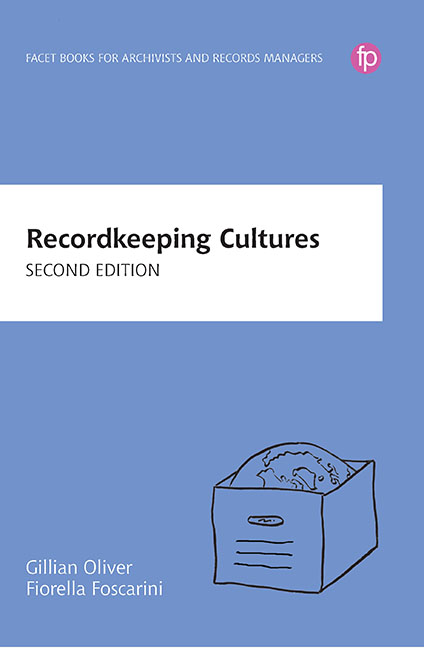6 - Awareness of Environmental Requirements Relating to Records
Published online by Cambridge University Press: 28 October 2020
Summary
This is the second of the two chapters focusing on factors at level two of the ICF, and addresses the extent to which staff are aware of environmental requirements relating to records and recordkeeping, and the need to develop training that focuses on this area.
The phrase environmental requirements is used as an umbrella term to encompass the laws, standards and norms present in the broader societal, jurisdictional and organisational context. They include regional, national and provincial or local legislation, as well as standards and codes of practice. Clearly, the first step in addressing this aspect of information culture is to identify what is relevant to a specific organisation. This is discussed in the first part of the chapter. This is followed by the steps needed to find out if existing organisational policy reflects those requirements, and to identify and take action on any gaps. The final stage is to find out to what extent employees are familiar with requirements and, most importantly, whether they are able (and willing) to put these requirements into practice. This assessment stage may involve surveying users – in contrast to the first two investigative stages, which can largely be explored by researching existing databases. Sample survey questions that can be used to identify training needs are suggested. The final part of the chapter discusses the training-related delivery choices that have to be made, and includes consideration of the relative advantages and disadvantages of different training-delivery modes (for example, group versus one on one, synchronous versus asynchronous) and highlights the need to develop sustainable training programmes.
It is important at this point to recall the ‘soft’ perspective that underlies our approach. Understanding the environment in which recordkeeping activities take place does not simply mean identifying external and internal requirements based on the available formal documentation. The latter will not tell us how the organisation actually works, how it enacts any of the identified requirements, how such requirements influence people's behaviour. Managing records is a social phenomenon that takes place in ‘human activity systems’ (Checkland, 1999), which are inevitably messy and unpredictable because they involve us, human beings who may always choose to act otherwise.
- Type
- Chapter
- Information
- Recordkeeping Cultures , pp. 95 - 110Publisher: FacetPrint publication year: 2019



